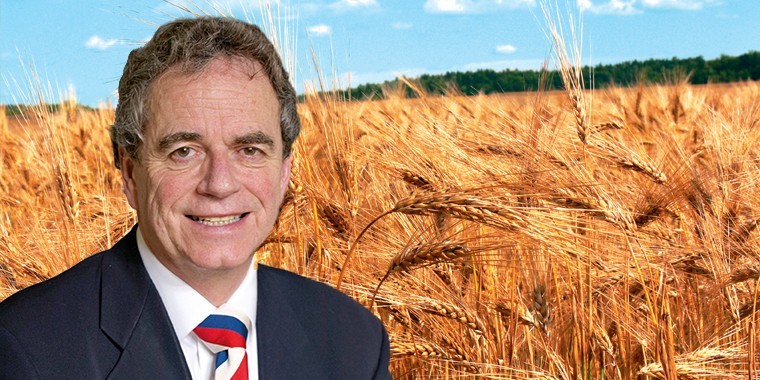By losing to Iceland, Roy Hodgson and the English team have managed to make themselves more unpopular in the country than David Cameron, Boris Johnson and Jeremy Corbyn! No mean feat that. Wales, the land of my fathers, has now progressed further than England in the Euros: enough said.
The immediate very short term effect of Brexit for the grain trade, has been beneficial: that is to say sterling has weakened by 76p against the euro pre referendum day, to 83p today (27/06/16). On Friday 24 June Liffe wheat futures increased by £3 with another £3 today, so £6 to £8 up since 23 June. We had better enjoy this as it might be as good as it gets.
Almost irrespective of the accepted fundamentals of supply and demand – which haven’t actually changed – our grain market will now be dictated by foreign exchange in the short to medium term. That has always been vitally important to the area of exports that I am involved with, malting barley, where every tonne I sell to Europe needs to be converted from sterling to euros. But it’s even more important when Openfield is shipping 60,000 metric tons of wheat or feed barley to third countries outside the EU.
These trades are transacted in United States dollars and today sterling fell to its lowest point against the US dollar for 31 years. So this weakness of sterling against the dollar is also giving the UK potentially a big advantage now – so long as the dollar price is not already being undercut by someone from the Black Sea.
So what does the future hold for the UK outside of the European Union? Well, this week, the 27 EU leaders will meet without the UK for the first time. The UK position will be that we won’t activate article 50, the exit clause, in EU treaties, until our new prime minister is in place. That looks like being three to four months off.
Of course Germany, France and the rest will want the UK to commence divorce proceedings immediately: well tough luck. We are the only party that can trigger that mechanism, and as none of the Brexiters seemed to have a plan B anyway, in the event of the referendum actually going their way, they won’t be rushing to do anything any time soon.
This is the first time since the European Economic Community (EEC) was founded that anyone has asked to leave, so it won’t be quick or easy. The process could take up to two years. But while that is going on UK farmers are entitled to expect that current legislation will stay in place. That means that they will continue to receive the basic/single farm payment. Also they can still apply for aid through the rural development programme. These payments are already part of the EU budget for the next four years; technically they continue until the UK withdrawal has been finally sorted out.
More importantly, while this is going on we must still have access to the single market. Could the EU impose import tariffs upon UK grain being sold to Europe? Technically they could: two months ago I wrote that they could treat the UK like any third country and apply a €10 import levy, but that would be difficult while the divorce proceedings are still taking place.
Another short term benefit for farmers is they could now fix the euro foreign exchange rate against their September basic payment scheme payment which could increase it significantly over last year’s payment. Before we joined the then EEC, I was exporting malting barley to Europe, using contracts which stated “import levy for buyers account.” Sometimes it was for “sellers account” depending on who needed the deal the most. Quite often there was no levy at all; but it worked, and it would work again.
Returning to the UK grain market, the Brexit driven rise over the past few days has brought back the opportunity to make sales: you really should not miss this opportunity. Some of the basic feed values are back to figures at which I was recommending sales months ago. This applies especially on oilseed rape having seen a £25 drop in recent times for no real reason: don’t risk that again.
Harvest has begun in southern Europe. French winter barley has had quite a lot of rain recently but yields are OK so far. The crop estimates continue to rise in the USA, Canada, Russia, Ukraine and Australia, and we still have the record known stock of wheat and maize hanging over the market.
So my pre referendum advice remains the same: if you like the price (which apart from oilseed rape you won’t anyway) get on and sell some. I don’t believe we are going to have another record crop in the UK. Wheat crops that have received spray treatment at the right time look very robust, but others don’t. For me we just haven’t had the daylight hours of sunlight to give the optimum conditions for quality and quantity. If the wet weather continues in France milling wheat quality and premiums could be interesting. Spring malting barley continues to be the crop of the year in the south.
With all that’s happened in the last week we seem to be alternating from “don’t panic” to “we are all doomed,” but let’s be optimistic. We produce some very good cereals and oilseeds in the UK which Europe does need – as we want their Mercedes and BMWs. That will continue, single market or not. Meantime, while reviewing the damage done to my house value, pension fund and job prospects, I feel a chorus of “always look on the bright side of life” coming on.




